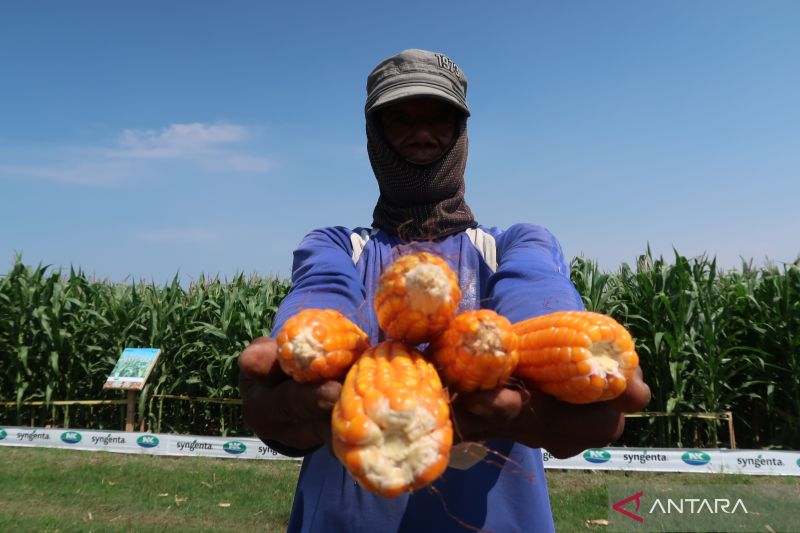Jakarta (ANTARA) - The phenomenon of climate change is getting real, starting from changing seasonal cycles to the emergence of various diseases hampering food crop production, thereby posing a challenge for development of the agriculture sector.
Despite myriad difficulties, scientists manage to create various solutions to meet human food needs amid the threat of the climate crisis, one of which is through biotechnology, also known as genetic engineering.
"Genetic engineering can make the impossible possible, such as obtaining corn plants that are resistant to stem borer," a biotechnology researcher from the National Research and Innovation Agency (BRIN), Happyawati Amirhusin, remarked.
Amirhusin made the statement during her visit to a genetically engineered maize demonstration plot in Probolinggo, East Java, at the end of May 2023.
Genetic engineering is a process of using recombinant DNA technology or artificial DNA synthesis, with the objective of altering the genetic makeup of an organism, with applications including producing superior plant seeds.
The emergence of genetically engineered crops is able to provide economic benefits to farmers, as plants will become more adaptive to changes in temperature and environment, resistant to plant-disturbing organisms, and increase the quantity and quality of yields higher than natural plants.
The Ministry of Agriculture noted that Indonesia has 10 genetically engineered seed products that have been registered, namely eight varieties of corn, one variety of sugarcane, and one variety of potato.
The genetically engineered seed products have also met government standards and are commercially available.
The ministry expected that genetically engineered seeds will be able to address the threat of climate change in the agricultural sector.
Thus, Indonesia is able to pursue the annual target of increasing agricultural production of 3.5 percent in order to meet the food needs of the population that is growing one percent every year.
Technology is the key that should be optimized in order to achieve food sovereignty, and one of the future technologies of the revolution is in the genes.
The method of plant recovery is no longer using the conventional and monocular method that takes decades. Currently, plant recovery only takes three to five years, which is much faster and more efficient.
At the global level, scientists have reached the genome editing stage as an effort to accelerate the goal of creating drought-resistant plants that can survive in stagnant water.
Benefits for farmers
The existence of genetically engineered seeds can provide great benefits to farmers, as they do not need to use pesticides. In fact, genetic engineering can also make plants resistant to herbicides that free the land from weeds.
The Strategic Partnership and Advocacy for Farmers and Fishermen (KTNA) noted that genetic engineering is included in the technology 4.0 favored by farmers.
For instance, genetically engineered corn crops are pest and herbicide resistant.
Weeding the corn field using natural seeds requires funds of around Rp150 thousand per day. If pesticides or insecticides are added, then production costs that must be incurred by natural corn farmers can reach up to Rp3 million.
Meanwhile, genetically engineered corn fields only require a budget of around Rp50 thousand for herbicide costs while the spraying can be done independently. Genetically engineered corn, with pest-resistant properties, does not need to be sprayed with pesticides or insecticides.
Another challenge faced by farmers in conventional farming is stem borers that can cut corn production by 25-50 percent. This figure is a major loss for farmers.
Through genetic engineering, farmers will be able to streamline the production process and slash production costs. Thus, there will be no stem borer to reduce the production quality, and this becomes an additional benefit for farmers.
Nowadays, farmers are interested to switch to genetically engineered seeds in line with the development of science in the field of plant biotechnology over the last two decades.
Biotechnology products are expected to become a solution in overcoming various social problems, especially food needs that have conventionally not been able to provide optimal results.
Realize the self-sufficiency target
The Indonesian government has set a national corn self-sufficiency target for 2024. Based on data from the Ministry of Agriculture and Statistics Indonesia (BPS), corn production in Indonesia continues to increase from year to year.
Corn production was recorded at 21.65 million tons, with a harvest area of 4.06 million hectares in 2018. Corn production then increased to 22.58 million tons, with a harvest area of 4.08 million hectares in 2019.
According to forecast data from the Directorate General of Food Crops of the Ministry of Agriculture, corn production also increased to 22.92 million tons, with a harvest area of 4.10 million hectares in 2020.
Corn production then clocked numbers that continued to grow, with the achievement of 23.04 million tons from a harvested area of 4.14 million hectares in 2021 then followed by the amount of corn production that increased significantly to 25.18 million hectares from a harvested area of 4.49 million hectares in 2022.
The Center for Plant Variety Protection and Agricultural Licensing from the Ministry of Agriculture remarked that the government encourages farmers to use biotechnology corn seeds to increase production. It is expected to help realize the target of self-sufficiency in corn and make Indonesia a corn exporter country in future.
If productivity is higher, then the amount of production from the same field will be higher as well. Hence, this potential is needed to gain profits in the agricultural sector and can support food sovereignty in Indonesia.
In Indonesia, the average corn production per hectare is five million tons. Meanwhile, genetically engineered products are capable of producing up to 10 million tons of corn per hectare.
If genetically engineered corn is planted in all of the four million hectares of land, then it is not impossible that the national corn production can exceed 40 million tons, which will annul the need for Indonesia to import the commodity from other countries.











